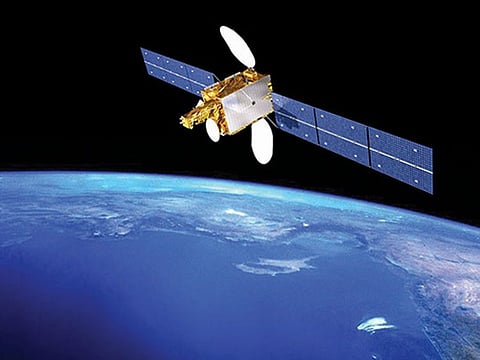Pakistan keen to explore space technologies for sustainable development
Scientists call for investing in space technologies to achieve socio-economic development

Islamabad: The hands-on educational opportunities, fascinating demonstrations and interaction with top scientists at a recent conference wowed several young students and inspired them to pursue science and technology careers.
“Generally, when we think about space science, all that comes to mind is astronauts. But this field is incredible. It offers benefits that are as infinite as the space itself in every field from health and medicine to transportation and computer technology” said Arsalan Khan, an Islamabad-based young student, sharing his understanding of the field after attending a conference focused on space science.
Space technology for socio-economic development
Held in Islamabad, the three-day international conference on space 2022 focused on the role of space technology and applications in socio-economic development. Experts at the conference encouraged applications of space technologies for sustainable development, including ensuring food security, health applications, access to telecommunications, reducing disaster risks, preventing humanitarian crises, monitoring natural resources, and environmental management.
The third International conference on space was organized by Pakistan Space and Upper Research Commission (SUPARCO) - the country’s national space agency mainly responsible for conducting peaceful research in space technology and promoting the technology for the socio-economic uplift of the country.
Asia Pacific Space Cooperation Organisation (APSCO), Islamic World Educational, Scientific and Cultural Organization and Inter-Islamic Network on Space Sciences and Technology (ISNET) also cooperated in organising the space summit.
Pakistan plans to send first astronaut into space
SUPARCO Chairman Major General Amer Nadeem said the national space agency is implementing various projects linked with national development and security. One of the projects is Pakistan’s ambitious plan to send the first astronaut into space.
He added that SUPARCO “is committed to promoting the use of space technology and its applications for achieving sustainable development goals adopted by the UN member states.” Space technology contributes greatly to confronting countless challenges in the fields of climate change, resource monitoring, disaster management and mitigation health and education, he said.
Research and investment
As many as 250 scientists, researchers, engineers, academia and heads of space agencies, including 35 foreign participants from 16 countries including UAE, Turkey, China, Azerbaijan, Australia, Canada, Egypt, Italy, South Korea, Malaysia, Austria and Switzerland attended the conference.
The conference featured 125 paper presentations on topics such as space technology, applications and education as well space laws and policy while workshops were focused on space applications, big data analytics, satellite navigation and microgravity.
Scientists called for “investments in space science, research and innovation” as well as attractive funding to create future career opportunities to attract and retain top talent in the country which has made minor progress in the field in the last decades.
President urges self-reliance in space tech
Pakistan’s President Dr Arif Alvi urged efforts to “achieve self-reliance” in space technology which he said was “significant for the country to match the pace of global scientific advancements.”
He asked the country’s space scientists “to explore capabilities in satellite navigation and promote relevant applications in areas of socio-economic development” and to use satellite data to strengthen climate resilience, farming system and water resources.
President Alvi also stressed the use of outer space for peaceful purposes to ensure and achieve sustainable development goals and called on the international community to prevent countries from turning space into a battlefield. He also visited the exhibition where he was briefed about Pakistan’s aerospace navigation systems and multi-purpose robots.
Investment in space technology
Experts suggested regional and international cooperation for capacity building, human resource development, technical infrastructures and attracting financial resources.
Recently, Pakistan’s national space agency signed an agreement with Turkish Aerospace Industries (TAI) to jointly develop communication satellites and other space projects.
The joint manufacturing would “significantly improve Pakistan’s existing space technologies as well as research and development,” aviation analyst Fahad Ibne Masood told Gulf News. Investments in space technology “is critical for Pakistan to develop and adopt applications for peaceful purposes, commercial space exploration.”
Pakistan’s satellite programmes
• Pakistan’s current fleet of satellites includes earth observation, remote sensing, and communication satellites, making Pakistan self-reliant in communication and high-resolution imaging while providing a wide range of different services to the country and valuable scientific data to global science communities, according to SUPARCO. • Badr-1 was Pakistan’s first indigenously developed and manufactured digital communications and experimental satellite which marked Pakistan’s successful footprint in space in 1990. Pakistan’s current fleet of satellites includes earth observation, remote sensing, and communication satellites, making Pakistan self-reliant in communication and high-resolution imaging while providing a wide range of different services to the country and valuable scientific data to global science communities, according to SUPARCO. • Badr-1 was Pakistan’s first indigenously developed and manufactured digital communications and experimental satellite which marked Pakistan’s successful footprint in space in 1990. • Pakistan launched its first communications satellite PAKSAT-1R in August 2011 which marked the defining moment in the country’s space programme. • In 2018, Pakistan launched a remote-sensing satellite (PRSS-1) and a technology evaluation satellite (PakTES-1A) after SUPARCO signed a space cooperation agreement with China. • SUPARCO has initiated an optical remote sensing application satellites program (PRSC-EOS) to build and launch optical remote sensing satellites by the year 2023. • The launch of PakSAT-MM1R satellite is slated for 2024.


